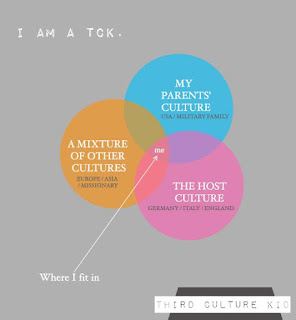We know the term for those people "who live much of their developmental years in a culture other than that of their parents'". They are called TCKs or ‘Third Culture Kids’.
They are now a rapidly growing demographic segment. And they ought to be viewed, I think, just like how ‘Millennials’ or ‘Generation Y’ are viewed.
 |
| Image Courtesy - Pinterest |
Not because TCK is an attractive segment we can focus on, as a marketing target – it is not - but because we can at least understand the unique pressures they face.
The ‘third culture kids’ however are not endemic to one particular country, and it may not be easy to quantify their number, or to evaluate their unique characteristics.
Uprooted from a culture where they - or their parents - were born, they grow up in a new culture to which they are expected to adapt. And they are taken there, mainly because parents were job seekers or migrants.
The children then become constant strugglers; Caught between the devil and the deep-sea.
On the one hand, they must meet the demands of parents who expect them to not lose the traditions or the language of their ancestors. And on the other hand, they must meet the school’s or neighbourhood’s needs of acclimatizing themselves to a culture which they, or their parents, were hitherto alien.
In the process, the kids get caught up in this strange amalgamation - the third culture.
Most expatriate parents feel an obligation to join kids in social organizations and social activities, around their own native communities, with the intention of preserving their offspring’s connection with their family roots.
Some parents succeed in sending their kids to language, music or dance classes that keep them grounded to their native culture and heritage.
But the balance is still a huge challenge. On one side is the invitation of a rapidly changing world, brimming with new challenges for future. And, on the other side is the beautiful and nostalgic relationship of parents, with their past.
One sad part of this kind of a third culture situation is also the kids’ loss of connection with grandparents, or with uncles, aunts and cousins, whom they left behind.
Loss of the language and cultural connection can prevent effective communication and thereby the much needed connection with relatives.
But who said that preparing young people for future is an easy task? It is not.
I found out that, in the 1950s, Drs. John and Ruth Hill Useem, anthropologists and sociologists, were actually the first ones to coin the term “Third-Culture Kids”.
They used it, apparently, to describe the children of American Foreign Service officers, missionaries, technical aid workers, businessmen, educators, and media-representatives living in India and other countries at that time.
According to them, the first culture is the country from which the parents originated (the home culture), the second is the country in which the family is currently living (the host culture), and the third is the expatriate community in the host country.
The term they coined, I think, is applicable today, more than ever. And the number of expatriate families, in the world, is rising.
The increasing geographic mobility, thanks to the increasing ease of transportation and communication, is changing global demographics.
With parents working in different countries, and with kids staying with them, one thing is certain. The third culture kids are, in fact, the ‘real global citizens’.
Our focus must therefore be to aid their global citizenship. An awareness and respect for their past, and yet an adaptability and willingness to embrace a new future.
In fact, here is article that gives us the reasons for why 'Third Culture Kids' must be hired. It is titled Five reasons why you should hire Third Culture Kids written by Alice Sergent.
She argues that TCKs have an advantage over others on these: Cultural Intelligence, Sensitivity to diversity & inclusion, Interpersonal skills, Adaptive & high tolerance of ambiguity, Innate curiosity & problem solving skills.
Whether we like it or not, for most TCKs and even others, today, “permanent addresses” are actually email addresses and Facebook accounts.
Click here for the published article in the my column in Bahrain's Daily Tribune.